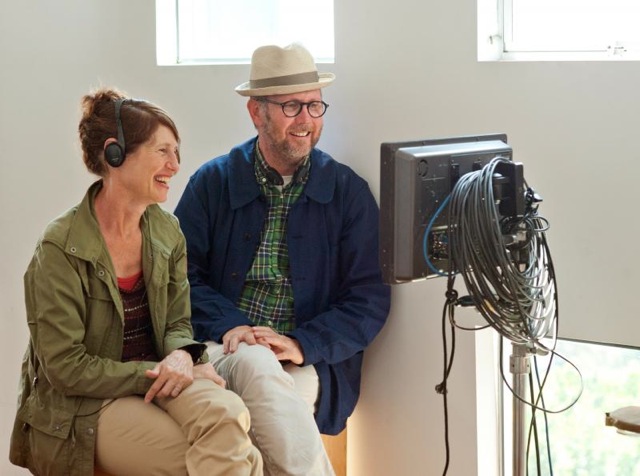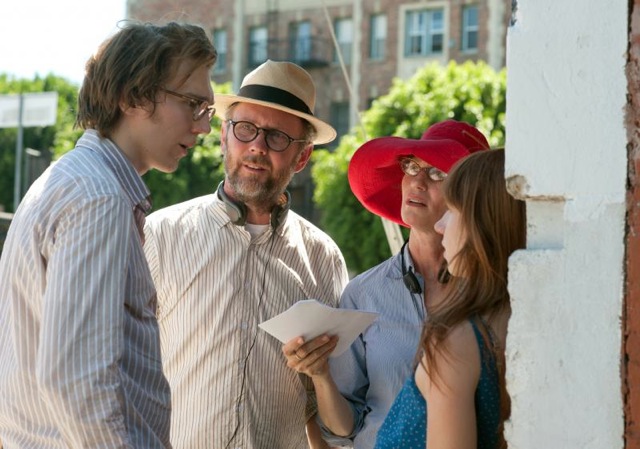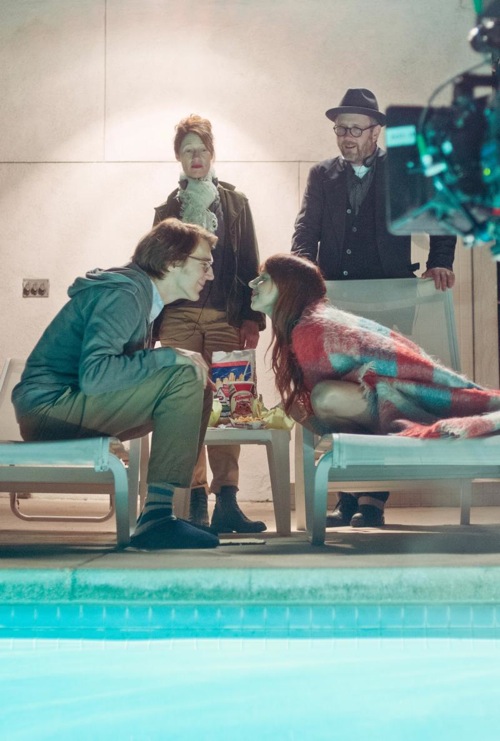CHICAGO – Patrick McDonald of HollywoodChicago.com appears on “The Morning Mess” with Dan Baker on WBGR-FM (Monroe, Wisconsin) on March 21st, 2024, reviewing the new streaming series “Manhunt” – based on the bestseller by James L. Swanson – currently streaming on Apple TV+.
Interview: Jonathan Dayton, Valerie Faris Bring ‘Ruby Sparks’ to Life
CHICAGO – It’s been six years since award-winning music video helmers Jonathan Dayton and Valerie Faris released their feature directorial debut, “Little Miss Sunshine.” It went on to become one of 2006’s most beloved sleeper hits and garnered a busload of accolades, including two Oscars. Yet it took many years for the couple to find the perfect script for their sophomore effort.
They found it in Zoe Kazan’s remarkably inventive debut screenplay, “Ruby Sparks,” which tells the story of a lovesick author, Calvin, whose dream girl suddenly materializes in his apartment. Kazan also happens to be the real-life girlfriend of Paul Dano, who memorably played the brooding, oft-silent teen Dwayne in “Sunshine.” The film stars Dano as Calvin, Kazan as his tailor made love, Ruby Sparks, Chris Messina as Calvin’s bewildered brother, and a talent-packed ensemble including Annette Bening, Antonio Banderas and Steve Coogan. Hollywood Chicago spoke with the directing duo about unrealized projects, cinematic fantasy, audience reactions, the joy of collaboration and the myth of perfection.
HollywoodChicago.com: I’ll start by saying that “Little Miss Sunshine” was one of the greatest moviegoing experiences of my life. When Greg Kinnear started dancing, the entire theater just exploded.
Valerie Faris: It’s so funny that you say, “When Greg Kinnear started dancing,” because that was his biggest fear when he took that role. He didn’t want to dance onstage, and he tried to convince us that he didn’t need to dance. We kept saying, “It’s going to be okay.”
Jonathan Dayton: “Are you kidding? This is your big, heroic moment.”
Faris: “This is when you decide that you’re going to support your daughter instead of pull her off the stage.” And he couldn’t process it. Even on the day [of the shoot], it was hard for him, and when he finally went up there and did that move, I was like, “Yes!” It wasn’t until he saw the first cut of the movie that he went, “Oh, okay, I guess it’s alright.”

Directors Valerie Faris and Jonathan Dayton on the set of Ruby Sparks.
Photo credit: Merrick Morton
HollywoodChicago.com: “Little Miss Sunshine” was Michael Arndt’s first script, and “Ruby Sparks” is Zoe Kazan’s first screenplay. Are you attracted to directing the work of fresh voices?
Dayton: You said it exactly, yes.
Faris: It’s absolutely true, but it wasn’t actually conscious. It just happened that this film came to us, we loved it, we worked on it for a while like we did with Michael, and we got to a point where we really felt like, “Okay, we all agree that this is the film we want to make.”
Dayton: In a first script, writers are bringing a lot of their lives to the table. There’s more time for the ideas to gestate. Once a writer becomes successful, it’s like the first album of a band. You have your whole life to write your first album, and for the second album…
Faris: You have three months. I also think there’s an authenticity to it. Nobody told them to do it, nobody asked them to do it. It came from something very intuitive and deep. All that they bring to it feels very authentic, and their voice comes through in a way that makes us respond to it. Both scripts are very funny and also have the potential to be emotionally stirring. So that’s what attracts us, and for some reason, first scripts tend to do that more.
HollywoodChicago.com: Has your comedic background in “Mr. Show” made you open to having actors bring their own ideas to a film during production?
Dayton: The director’s job is to mine the potential of a concept, whether it’s your initial work with a writer or who you cast or how you work on the set. We don’t do a lot of improv. Because there are two directors, we have to have a pretty distinct plan.
Faris: Especially in this case because our writer was going to be on the set. We wanted to have the script behind us in a way. That doesn’t mean that [unscripted] moments arise, and I feel that if you’re doing it right, the whole film should feel improvised. The goal for us is to get the dialogue that’s written to feel lifelike and feel like it’s actually happening in that moment.
Dayton: When you get a great script, the challenge becomes, “It’s a great read, but what is the film?” We worked a lot with Zoe and the other actors to find the most economical and emotionally potent way to tell the story.
HollywoodChicago.com: Is there a benefit to having a male and female perspective on this material, particularly because it centers on a male’s idealized perception of a female from a female screenwriter’s perspective?
Faris: Because Zoe was writing for a man writing a woman, she was definitely thinking about how men write women. In my work, I don’t think very much about coming from the woman’s perspective, because we work so closely.
Dayton: But you do and I have to say when we would rehearse these scenes ourselves and act things out, you clearly would bring your perspective as a woman. It’s fundamental to the work you do.
Faris: But I don’t think that’s discussed.
Dayton: It’s just there. We don’t say, “And now, Valerie, as a woman…” You just weigh in, but it can’t be separated from your life and all that you’ve experienced as a woman.
Faris: But I think that maybe you do see the male perspective more than I see the—
Dayton: No, no, no.
Faris: A lot of times you’d say, “Men really respond to this.” You’ll voice the male perspective more than I voice the female perspective.
Dayton: Okay, I get that. In Chris Messina’s moments where he says, “For men everywhere, you can’t let this go to waste,” I could both identify with that as the man that I am, but I could also separate myself and know that Chris was voicing the ultra-male perspective.

Chris Messina, Paul Dano and Zoe Kazan star in Jonathan Dayton and Valerie Faris’s Ruby Sparks.
Photo credit: Fox Searchlight Pictures
HollywoodChicago.com: Chris Messina displays a wonderful comic sensibility in this film. How did you go about casting him?
Faris: We’ve been a fan of Chris just from seeing him pop up in different films here and there. When we auditioned him, we realized that he sold the brotherly bond so well. I really believed that he loved Calvin. He’d support him and care for him and go through this with him. He also has a kind of regular guy quality that was really important to us. Like all of the actors in “Little Miss Sunshine,” he’s one of those actors who can move from drama to comedy very easily. There’s no, “Now I’m being funny and now I’m going to be dramatic.” It’s all one in the same. He can deliver the comedy in a very real fashion.
Dayton: We considered a lot of comedians for the role but we ultimately found that it’s so important that Harry [Messina’s character] is the guy who represents the audience. When he accepts that Ruby is real, we’re going to accept it. We needed someone who had a gravitas, someone you trusted and Chris was that guy.
Faris: Some guys would just be like, “Yeah, this is cool,” from the beginning, but we loved to have Chris just bothered by this [fantasy]. He knows this isn’t how life works, so it’s a bigger task to bring Chris to the point where he starts buying into this premise. There are certain actors who can really do comedy and drama as indistinguishable from each other. They’re always playing the drama in the story…
Dayton: And they’re playing the truth.
Faris: He reminds me a bit of Greg Kinnear because they’re both playing the straightman, and in both films, they’re the engine of the film. Chris drives the story and moves it along in a certain way.
HollywoodChicago.com: Greg Kinnear’s pursuit for perfection in “Little Miss Sunshine” is similar to Calvin’s goal to create the perfect female companion, and the ultimate lesson they learn is to embrace the imperfections of life. In your own perceptions of life in modern America, do you feel that images of perfection are halting relationships?
Faris: Yes, you really said it. There’s a lot that we’re not happy with in life today, especially when you’re raising kids and everything. What’s nice is when you have a film that allows you to express some of your reactions and feelings about the world. I think that this story is very personal to us. Even though we didn’t write it, it’s still our film and it speaks to a lot of the things that we feel about modern life.
Dayton: That’s one reason it took us six years to make another movie. We simply couldn’t find a project that had the richness that we needed.
Faris: Well, we did find projects that had the richness, they just weren’t complete. We’d work on the scripts for other films that we loved equally and never felt like we got them to their full expression.
Dayton: They may come later.
Faris: I really loved those films and fully intended to make them. Some films are hard and some take longer. So often, I hear the story behind films that I love and find out that it took seven or ten years to make them. “Blue Velvet” was something like 10 or 15 years. I just think films do take time. We worked with Zoe for nine months, it’s just part of us becoming the authors of the film. So six years doesn’t seem that long to me in film years.

Actor Paul Dano, directors Jonathan Dayton and Valerie Faris and writer/actress Zoe Kazan on the set of Ruby Sparks.
Photo credit: Merrick Morton
HollywoodChicago.com: In both of your films, Nick Urata’s music has a soulful quality that makes the audience more emotionally in tune with the characters. What attracted you to his work?
Dayton: Again, you got it. It’s really nice to hear you talk very succinctly about these things. We were really attracted to Nick’s ability to give an emotional charge to a piece of music. For us, soundtracks too often feel very generic and he has a gift for writing beautiful melodies that make you feel something…
Faris: Without playing completely to what we want the audience to feel. I never feel like the music is manipulative. Nick moved into the edit suites with us and we worked very closely back and forth.
Dayton: The music was created with the film.
Faris: We didn’t bring him in at the end
Dayton: We evolved together.
HollywoodChicago.com: Your music video for “Tonight, Tonight” by The Smashing Pumpkins pays homage to the visionary work of Georges Méliès. Would you ever consider making a film that is more of an overt fantasy?
Dayton: We’ve had projects like that. We were working on a film with Demetri Martin that depicted a heaven-like world…
Faris: It was called, “The Beyond.” The movie itself was called “Will.”
Dayton: And we had a Ben Stiller movie that took place in the future in a world run by women, so we had to create a whole universe.
Faris: So, the short answer is, “yes,” but the challenge for us is to not let that be the focus of the film. For us, it’s always the story, so if the right story needed to be told in that world, then great. But we’re not interested purely in the visuals, we’re always interested in how the story is expressed through the visuals. We’ve gotten a lot of children’s books that people want to adapt and sometimes the themes are interesting, but they usually don’t speak to us. The next thing that we’re doing is a pilot for HBO. Daniel Clowes, who wrote “Ghost World,” wrote a really funny, biting character and it’s a series called “The Landlord.” That will be fun, and we’re trying to figure out what the show’s world will look like. It’s our world, but since it comes from the comic book world, and Daniel’s drawings are so incredible, we’re hoping to draw from his aesthetic.

Actor Paul Dano, director Valerie Faris, writer/actress Zoe Kazan and director Jonathan Dayton on the set of Ruby Sparks.
Photo credit: Merrick Morton
HollywoodChicago.com: “Ruby Sparks” doesn’t back away from the darkness in Calvin’s character, and I felt that by not going there, the film wouldn’t have earned its final moments.
Faris: Not everyone recognizes that it had to go there. Why do this story unless you’re going to go there?
HollywoodChicago.com: Was it a challenge to gauge that darkness?
Dayton: From the moment we read the script, that was both the opportunity that we saw, but also the challenge.
Faris: And the hardest thing to see on the page. We didn’t know what it was until we were in the editing room, but that’s what’s fun about it. You think that you can figure it all out [beforehand], but some of it you have to figure out in the process. Editing is also such a huge part of this. On both pictures, we’ve worked really closely with our editor, Pamela Martin. She cut “The Fighter” too. She’s really great, and we spent every day with her for eight months. Everything else happens really quickly, but editing is a slower process.
HollywoodChicago.com: What has it been like experiencing this film with an audience?
Faris: We love it. It’s scary to think that someday everyone will be watching films only on a computer. Watching “Ruby Sparks” with an audience for the first time, we were surprised by how far into the film they were laughing. We thought the laughing would stop at a certain point, like when [Calvin] holds [Ruby’s] face in the kitchen. People laugh at that, and we always thought that was a really chilling scene. It’s funny, but then it turns serious, and the theater eventually becomes silent.
Dayton: But it’s nice to share that silence too…
Faris: To feel that the audience is moving through this journey together.
 | By MATT FAGERHOLM |


